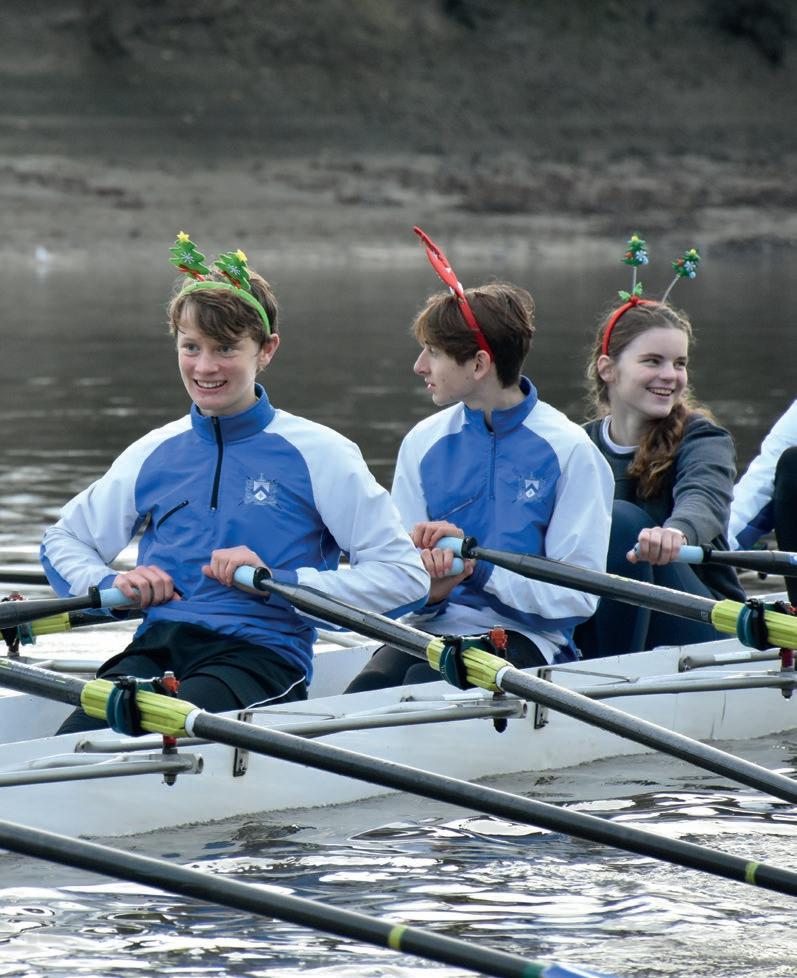 WINTER 2022 NEWSLETTER FOR LATYMERIANS (ALUMNI OF LATYMER UPPER SCHOOL)
WINTER 2022 NEWSLETTER FOR LATYMERIANS (ALUMNI OF LATYMER UPPER SCHOOL)
expressed in our feature pages belong solely to the interviewee and/or author, and do not necessarily reflect that of Latymer.
The Latymerian Council (UK)
1971 John Davidson
1973 Steve Faktor
1976 Paul Taylor
1976 James Graham
1979 Mike Cooper
1990 Harmeet Ahuja 1991 Rajesh Goyal
1992 Laurence Hopkins - Chair 1994 Kunwar Ahuja 2000 Alan Sendorek
2008 Suzanna du Plessis (née Rennie)Deputy Chair
2014 Connie Campbell 2016 Charlotte Collingwood
The Asian Latymerian Council
1966 Victor Apps 1971 Malcolm Hanney 1990 Mark Syn 1998 Raymond Shuai - Chair 2009 Archie Preston
The Australasian Latymer Council
1946 Basil Walby 1955 Clive Trotman
1956 Jim Tilley 1969 John King 1994 Eddie Gapper
1995 Thomas Correia 2004 Aleco Lazaridis
The Canadian Friends of Latymer Board of Directors
1955 David Havard
1957 Trevor Jones - Chair 1957 David Stiles
1960 C. Hugh Grant 1962 Jeffrey Simons 1963 Peter Basey
The US Latymerian Council
1964 David Godfrey - Treasurer 1965 Peter Taylor 1967 David Kendall 1968 Robert Stevens 1969 Simon Kisch 1976 Maciek Brzeski 1976 Jamie Grant 1980 Mark Bullimore - Chair 1989 Tony Hynes 1992 Anton Xavier 2004 Abi Ronan 2010 Josh Henderson
The Foundation Office Team:
Amanda Scott
Executive Director, Latymer Foundation ams@latymerfoundation.org
Siân Davis
Alumni Relations Manager sdd@latymerfoundation.org
Rhianna Williams Alumni and Communications Officer rpw@latymerfoundation.org
Natasha Nolan Bursaries Appeal Manager njn@latymerfoundation.org
James Thorpe-Woods Fundraising Assistant jet@latymerfoundation.org
Johanna Ingram Events Manager jci@latymerfoundation.org
Kitty Farrell Development Assistant kjf@latymerfoundation.org
David Jones Database and Finance Manager dvj@latymerfoundation.org
Nicola Rivis
EA to the Executive Director ncr@latymerfoundation.org
Independent Consultants (Alumni Relations):
Sally Markowska sjm@latymer-upper.org
Nigel Orton latymerians@latymerfoundation.org Chris Hammond latymerians@latymerfoundation.org
Latymer Foundation Office Latymer Upper School 237 King Street, Hammersmith W6 9LR latymerians@latymerfoundation.org www.latymerfoundation.org
THE HEAD
As you may have heard, after considerable reflection over a period of many months, I have decided to step down as Head at the end of this academic year (August 2023).
I would like to pay tribute to the Governors of the Latymer Foundation, who, in 2012, put their faith in a young and unknown Deputy Head. In particular, I have had the privilege of working with three outstanding Chairs in the shape of James Graham, Ros Sweeting and Kieran Murphy.
I have full trust and confidence that, in the capable hands of Kieran and my successor, both the Foundation and the School will continue to go from strength to strength.
David Goodhew Head
NEW CHAIR OF GOVERNORS APPOINTED


We were delighted to welcome Kieran MURPHY (1976) as the new Chair of Governors of the Latymer Foundation in July.

Kieran is in his first academic term as Chair, having taken over from Rosalind Sweeting, LLB in July this year Ros, had been in the role since July 2017. Kieran has been on the School’s Governing board since December 2020. He attended Latymer Prep and Upper Schools, leaving in 1976, having been a beneficiary of a free place (LEA Scholarship) throughout his time in the Upper School.
Kieran brings a wealth of experience and passion for Latymer and its ambitions to promote social mobility through outstanding education and access to opportunity.
The School is incredibly grateful to Ros for her dedication as Chair during the past five years, particularly during the challenging years of the pandemic. We thank her for her service to the Latymer Foundation, the School, and the community, as she steps down from the Board after nine years.
Latymer Foundation’s Executive Director of Development, Amanda Scott: “It has been a great pleasure and privilege to work closely with Ros over many years, firstly as a member of the Latymer Development Committee and then as a Governor and latterly as Chair. Ros has always been a wonderful advocate for our bursary programme and her unflagging support for our ‘Inspiring Minds’ campaign has been instrumental in its success. As Ros hands over the baton, I very much look forward to working with Kieran as Chair in the years ahead.”
GOOD LUCK, GARETH
During his time at the Latymer Foundation, our Director of Development, Gareth de Graaff, has worked closely with our Executive Director, Amanda Scott, on the final stages of the Inspiring Minds campaign.
Gareth:
“I am sad to leave the Latymer Foundation team as I relocate to the coast, but I leave with the knowledge that our goal of raising £40 million pounds is in reach – and will provide a strong foundation to build on as my colleagues work to achieve a need-blind admission process to Latymer.”
CONGRATULATIONS!
Hendy of Richmond Hill, of Imber in the County of Wiltshire
Nick DE MARCO KC (1985) has won the Legal 500 Sports Law Silk of the Year Award for 2022

Harrison DUNK (2009) has officially become Cambridge United FC’s longest serving player

Sir Peter HENDY (1971) – Chair of Network Rail, has been made a crossbench peer in the House of Lords. His full title will be The Lord
Hermione OLDHAM (2016) has won funding for her short film ‘Adam’s Tale’ from the BAFTA and BFI accredited UK Jewish Film Festival
Former LUS chaplain, Reverend Peter Simpson received his MPhil degree from the University of Leeds this July


Disclaimer:
020 3004 0466 A LETTER FROM
All views, thoughts, and opinions
Ros Sweeting
Hannah BRANDLER (2014) has been named Features Journalist of the Year in the Destination category at the Business Travel Journalism Awards
Sir Peter HENDY (1971)
Reverend Peter Simpson
CAREERS
n Polly ADAMS (2012) is now Franchise Strategy Manager at LIV Golf
n Safwan AMIN (2002) is heading to Washington DC to join Patton Squire Boggs on their International Dispute Practice Team
n Aida ANSAH-PALMER (2012) has been appointed as a Product Manager at Wolf & Badger

n Rahul BRAINERD (2018) has joined Shroders as a graduate
n Pym CANTELLOW (2010) has become Head of Marketing and Communications (China and Hong Kong) for the Department of International Trade
n Noémie CETNAROWICZ (2014) has joined Euclid Transactional as a Legal Secondee
n Toby CROUCHER (1990) has been promoted to Senior Vice President (Climate and Nature) at Stora Enso
n Louis GEARY (2010) has qualified as a solicitor, working in the exceptional employment law team at Mills & Reeve
n Polly GREEN (2015) is now an associate Lawyer in Mischon de Reya’s White Collar Crime and Investigations Team
n Andre KALJEVIC (2014) has joined Bird & Bird as a Future Trainee Solicitor
n Sarah KINGSMILL (2013) has been promoted to Information and Content Officer at Sarcoma UK
n Sam LYTTON COBBOLD (2016) has joined Audere International as a Research Intern
n Joe MARKOWSKI (2006) has been promoted to CEO, North America at DAZN Group
n Ashiana PRADHAN (2011) is now a Senior UX writer at JPMorgan Chase
n Hamish WATSON (2016) is working on a Channel 4 programme called The Greatest Auction
n Ben WEAVER (2016) has started a new position in the sales team at ARInsights
n Bob WHELDON (2012) has become a Family Associate at Farrer & Co, having recently qualified as a solicitor
EDUCATION
n Charles CUNNINGHAM (2011) has just completed his Biology PhD at the University of York on systematic conservation planning
n Imogen CUNNINGHAM (2016) has recently graduated with a distinction from her International Real Estate and Planning MSc at the Bartlett Real Estate Institute, UCL
n Sky RITCHIE (2013) is pursuing her MBA at Northwestern University’s Kellogg School of Management
n Lizzy WHITEHOUSE (2017) has graduated from the University of Oxford with a 2.1 in Classics
LATYMERIAN CREATIVES
n Isabel ADOMAKOH YOUNG (2011) has joined the cast of AppleTV+ show, Foundation. Series two comes out in 2023!
n Saul BOYER (2010) held a sell-out run of his production, Man of 100 Faces at the Edinburgh Fringe.

n Misia BUTLER (2017) has been cast alongside fellow Latymerian Hugh GRANT (1978) in a new Netflix series based on Greek mythology, KAOS
n Richard KESSEL (1971) played God in the play Children of Eden at Winston Churchill Theatre in Ruislip
n Tank NASH (1958) has released his new book, In The Service Of The Emperor

n Peter POPHAM (1970) has published his novel India Be Damneda novel of Partition
n Madly, Deeply: The Diaries of Alan RICKMAN (1964) was published this October

n Gillon STEPHENSON (1985) has collaborated with his mother, the author Lynne Reid Banks, on a new children’s book, The Red Red Dragon.

n Stephen WYATT (1966) has written a collection of short fiction – The Wallscrawler and Other Stories

NEWS 3 ALUMNI NEWS
What have you been up to? Let us know your latest news: Latymerians@latymerfoundation.org
Isabel Adomakoh Young
RECENT NUPTIALS
Milo COMERFORD and Tessa KILGARRIFF, both from the Class of 2010, married one another in Godalming, Surrey, this October.




They were joined by plenty of fellow Latymerians including Milo’s sister Martha COMERFORD (2016) and Tessa’s sister Ella KILGARRIFF (2017), as well as classmates Chris PIGOTT, Alex MARSH, Sam MUTTER and Evan MCKENZIE (all Class of 2010).
From left to right: Lucas MANSILLA, Adam ROSENBAUM, Harry ECKERSLEY, Michael WILLIAMS, Felix LEACH (all Class of 2012).
Jonny ROSS-TATAM (2012) split his wedding over two days, with the official wedding in a Civic Hall with immediate family and best men/maids of honour, followed by a big shindig (including Scottish Ceilidh dancing) two days later.

Latymerians Bob WHELDON and Felix THOMPSON (both Class of 2012) were two of Jonny’s best men!
▶ Louisa JONES (2008) married Florian Cooper in the Chapel at Brentwood School, which Florian attended and where he is now Director of Performing Arts Louisa is Head of Religious Studies at Bancroft’s School, Woodford Green. The wedding was attended by many Latymerians – including Sam CHALLENOR, Tom OVENDEN and Sam NEWTON (all Class of 2008).
Dorothy IZETT (2010) married her partner Tom White in a civil ceremony in Singapore, ahead of their official wedding celebration Bali this December.
On 8 August, Greg CONWAY (1964) and his partner, Elaine Barr, were married in a civil ceremony at the De Vere Latimer House, in the village of Latimer, some three miles from their home in Amersham, Buckinghamshire. The couple, who met through their work in the Civil Service, have been together for over 30 years.
Although there’s no connection between the location and the school or Edward Latymer, it may be of interest to know that during WWII the hotel was a POW establishment for senior enemy officers, that it was extensively “bugged”, and that the intelligence gained from the overheard conversations was said to have been immensely valuable to the war effort!
Charlie PORTER (2009) got married at Trinity Buoy Wharf in the Docklands this October. Latymerians in attendance included Harriet MORRIS, Jess DEAKIN, Indy FITZPATRICK and Hannah MARKOWSKA (all Class of 2009), as well as former English teacher and Latymer alumni team member, Sally Markowska!



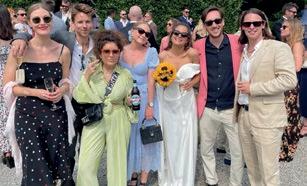
On 21 May, Ed MALTBY (2000) married Hayley Walsh after nearly 10 years together. They tied the knot in Vale Do Lobo, Algarve, Portugal.

With the exception of Hayley, everyone from the above photograph is a Latymerian! Aside from Ed’s brothers David MALTBY (1997) and Chris MALTBY (1994), the group are from the Class of 2000.
From left to right: Mayanga Croasdell (née KARUNADASA), Tom GREEN, Claire Savage (née CAPELL), Alan SENDOREK, Hayley Walsh (Bride), Ed MALTBY (Groom) Luke CASSERLY (Best Man), Alice Riddle (née HOBSON), Maudie Casserly (née GUNZI, married to Luke Casserly). Chris MALTBY (1994).
David MALTBY (1997)

NEWS 4
Max DARNTON (2007) officially wed Binky Felstead at Chelsea Town Hall last year, but finally got to celebrate with family and friends at their second wedding in Corfu this summer.
James BLACK (2010) married Ella Hill at St. Michael and All Angel’s Church in Barnes this September. They were pleased to have many Latymerians from the Class of 2010 in attendance; Daniel JAFFE, Sam CALDER, Alex PARR, Dominic VAN ALMSICK, George AUCKLAND (best man), Alice GREGSON, Sam CLIFTON, and Fr. David ADAMSON (who married them in his capacity as priest!)
Lily BROWN (2008) got married this summer in Cornwall with many Latymerians in attendance: Finn FREW, Ollie PEARCH, Otis INGRAMS, Holly AHOM and Harriet POLAND, Gabby ENDACOTT, Harriet CHANDLER, Alex PICTON, and Josh LLOYD-WATSON (all Class of 2008)
Andrew WHITESTONE (2007) married Kaz, in Kingston upon Thames this July.
LATYMERIANS BACK ON KING STREET
Saman RABBANI (2004) joined us at the end of September for a school tour. Sally Markowska, former Latymer English Teacher led the tour and enjoyed catching up with Saman as he recounted his most memorable moments at Latymer – including some of the mischief he got up to!

Rob STEVENS (1968) has lived in the US for many years and hadn’t been back to King Street for over three decades! Rob was very impressed by the way the School has evolved, with some of the site unrecognisable to him, although he was reassured that much remains the same; his name is still on the board in the Main Hall.

Alan HAYTER (1945) visited us to take part in our Latymer Listening Project, set up to collate memories and photographs from school days past.


LATYMER MEET-UPS

John BARNES (1955) kindly donated another of his publications to our library; this time an update on the programming language that he developed called ADA. ADA has been used across the globe from air traffic control systems to military operations!
A group of US Latymerians met up for brunch in New York City this November.



In attendance were Pierce MULLIN (2011), Olivia VON STAUFFENBERG (2018), Izzy VON STAUFFENBERG (2017) Mark BULLIMORE (1980), and Mark GIZEJEWSKI (1995) - who is pictured alongside his newly married wife, Olga.
A group of former Latymer Combined Cadet Force members, The Fledgling Army run by Tom Stewart (otherwise known as the FARTS), met for their annual lunch this October in Hammersmith. They had a great time, dampened only by wishing that that late FARTS founding member, Tony MEIER (1956) was with them. Our Alumni Manager, Sian Davis, and Former Deputy Headmaster, Chris Hammond, were pleased to join the group on this special occasion.
We were delighted to welcome 2022 Booker Prize nominee and Latymer alumna, Maddie MORTIMER (2014), to talk to current students about her award-winning debut novel, Maps of our Spectacular Bodies Maddie is pictured with her former Head of Year, Sally Markowska.

Zita COLLIER (2019) came back to Latymer to tell students about her fascinating dissertation on ‘Scouse Exceptionalism’ which she undertook as part of her Political Science and Sociology degree at the University of Birmingham.
VISITS
A group of Latymerians now studying at Georgetown University in Washington D.C. met up for a coffee and a catch-up! Pictured are Sofia LALATTA COSTERBOSA and Alexia ARGYROPOULOU VON WIESE (both Class of 2022) together with Soraya DHANANI and Millie BEDDINGTON (both Class of 2021)

The US Latymerian Council held a special Zoom get-together in honour of Founders’ Day 2022. In attendance were; Peter TAYLOR (1965), Chair of the Council Mark BULLIMORE (1980), David TALBOT (1964), Maciek BRZESKI (1976), David GODFREY (1964), Tony HYNES (1989), David KENDALL (1967) and Rob STEVENS (1968)
From top left - Kelvin UNG (1996), Dodo CHENG (1988), Nick LEACH (1971), Victor APPS (1966) and Raymond SHUAI (1998)
Our Asian Latymerian Council enjoyed a dinner together in Hong Kong! The Council, chaired by Raymond SHUAI (1998), is a fantastic way to network and make new friends in the region, as well as keeping you in touch with the School, the Latymer Foundation, and our alumni community around the globe.

Are you located in Asia? The Council would be thrilled to have you join them. For details, please contact Siân Davis, Alumni Relations Manager on sdd@latymerfoundation.org
We are so grateful to our Old Latymerians’ Cricket Club which raised £300 over three matches this summer for the Bursaries Appeal by kindly donating all leftover monies from their subs. Special thanks go to our OLCC captain Tim BENSON (2017) and his deputy Dino ANTONIADES (1985) for organising the matches. If you’d to like join the team for the next cricket season, sign up under ‘Groups’ on www.LatymerConnects.com, your alumni network or email us at Latymerians@LatymerFoundation.org. Next season’s fixtures will take place across three Sundays in June – 4th, 11th and 18th. It won’t be long until we’re enjoying the fantastic wicket at Wood Lane once again!
ALUMNI
5
Would you like to be involved too? We’d love to hear from you. Reach us at Latymerians@latymerfoundation.org
Trevor GROSS, who now lives in Australia, recently visited the UK with his wife and caught up with friends Ashok ARORA (1985) and Raj MATHUR (both Class of 1985)
OLD LATYMERIANS’ CRICKET CLUB
MEMORY LANE
REMEMBERING QUEEN ELIZABETH II
APRIL 1926 - SEPTEMBER 2022
In September, we wrote to you in our weekly newsletter (through LatymerConnects.com), asking for your memories and recollections of the Queen’s reign. Thank you to all those who responded to us. We are pleased to share some of these special memories below.
Richard ALFRED SPARKS (1961)
I am, I suspect, one of few Latymerians still alive who actually attended the Coronation of HM Queen Elizabeth II. My father J.A Sparks was Member of Parliament for Acton and had therefore been allocated two seats in a Stand just outside Westminster Abbey. My mother hurt her back on the evening before the Coronation and would not have been able to sit for so many hours, so I was allowed to go in her place. I was 10 years old at the time.
We travelled to Westminster on one of the special trains which started at Kensington High Street. I still have my ticket which I kept as a souvenir. I recall that the processions to and from the Abbey took place in heavy rain!
The most exciting event from my point of view at the time, was the Coronation Review of the Fleet - which took place on 15 June off Spithead and which I also attended with my father. We were on the deck of HMS Perseus a Light Fleet Aircraft Carrier. There were 14 miles of warships from Great Britain and other countries being reviewed by HM the Queen.
Andrzej KINAST (1976)
I met the Queen and Prince Phillip at a reception held for the ex-pat community in Warsaw on the occasion of the State visit to Poland in 1996. Poland had recently (1989) freed itself from Soviet oppresion and was getting ready for NATO and EU membership.
Every year on the Queens’ offical birthday there was a reception at the Ambassador’s residence. One year a Spitfire flew over the grounds and then did a barrel roll over the German Embassy!
It has been quite the shock to lose the Queen. Even at her age I felt she would just keep going. I am glad she worked till the end - she set a good example even to those who are not in favour of the monarchy.
I became quite nostalgic thinking about being told when King George had died when I was at prep school in Chiswick. My mother came to pick me up and when we got to the Turnham Green station news stand there was a newspaper banners saying King George had died.
In April 1954, I was privileged to be asked by the BBC to sing ‘Home, Sweet Home’ with the view to conclude the ‘Welcome Home’ broadcast for the Queen when she returned to Britain after her tour of the Commonwealth.
The line-up of artists who took part were well known and loved by all, then right at the conclusion of this long performance, on trotted little me (due to be 13 years old a few days after) onto the crowded Palladium stage, complete with an Eton collar, to sing ‘Home, Sweet Home’! The Queen wasn’t present, but I guess and hope that she managed to sit in front of her radio to hear it!
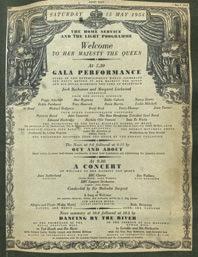 Robin FAIRHURST (1959) John ELLIOTT (1958)
Robin FAIRHURST (1959) John ELLIOTT (1958)
The day the King died, my schoolfriend, John SHEPPARD (1958) met me at the front of the school and suggested that we go up to the chapel for a short time to gather our thoughts and prayers for the new Queen and the late King. He was a leader when I needed one and this was demonstrated in his subsequent career as a prized documentary maker. I have, ever since, been grateful for this act of friendship.
Manfred MICHEL (1956)
In both my countries, Germany and Belgium, there is sadness and mourning at the passing away of Queen Elizabeth. She visited both countries five times amidst popular enthusiasm.
I entered Latymer in January 1952. On 6 February we pupils were sent home when the death of King George VI was announced. His daughter Elizabeth assumed the succession, and in June next year my whole family was in Oxford Street watching the impressive coronation procession lasting two hours with contingents from every part of the British Empire.
Years later, on 12 May 1992, I remember the Queen visiting the European Parliament in Strasbourg, where she made a remarkable speech, quoting Jean Monnet in perfect French. Seeing this was a highlight of my career in that institution.
Tank NASH (1958)
On the day that Queen Elizabeth returned from Kenya I recall we were sent home from school early. Aged 13, I waited outside the cinema on the corner of King Street.
In due course the car came from Heathrow down King St, and as it drew level I raised my cap. It was 37 years before I had the chance to speak to her.
6
David GODFREY (1964)
In 1953, as an officer cadet in the Royal Navy, I was one of many lining the Queen’s route in Parliament Square from her coronation. She passed by in the royal carriage just a few feet in front of me.
A decade later, in the 1960s, when I was a lecturer at Fourah Bay College in Freetown, Sierra Leone, the Queen made a visit to the university and participated in the convocation to present degrees.
Later, I was driving up the hill to Mount Aureole, where I lived. Her cavalcade was coming down the hill. The police stopped me from completing the last few yards to my driveway and I had to back down the hill (tricky to do) and into someone else’s driveway, to sit and wait for her to go by.
Geoff WOLF (1954)
I remember that it was not unusual to come out of school on Friday afternoon at 4.10pm and watch the royal family being driven to Windsor along King Street which was then still the A4.
On the morning of 6 February 1952 I heard that King George VI had died. I was at home awaiting my first O level mock exam in the afternoon. I changed from a school tie to a black one before leaving.
I clearly recall the Queen’s coronation in 1953 as I had just started at my first prep school. The pictures of the event were underpinned by a gift of a model of the gold coach and horses that I treasured for years.
John BENNETT (1965)
LANE-SMITH (1952) Mike JOHNSON (1958)
Peter PEGNALL (1967)
The Marie Claire sports a royal blue flag, it braves the waves in most weathers, does not bow or bend to woman or man, marks Dan’s ownership. What do we truly own?
Pages and pages of tributes, private life laid bare like a skinned animal, words words words? A handful of ashes in the North Sea, the wind on the Broads.
Mankind that is born of woman has but a short time to live, slips away as Jasmine smears Mr. Whippy on John’s face, as gulls catcall the old man in the spray.
Elizabeth had film star looks, iron will, human fragility; a chronicle in flesh and bones, a blitz of a woman, she played herself to near perfection.
We asked too much and yet she gave more, a tigress under instructions. Enough, let her go; that day in St. George’s Chapel she was alone, stripped of that old rascal, a man strong enough to play second fiddle, himself an orphan. His wife was faithful to a fault, beamed smiles for the out of luck, politicians, artists, sons, Trump or Tarbuck.
Fare well, the best of your kind, we shall not meet your equal. Peace to your body, peace to your mind, may your royal flag unfurl.
The first time I was presented to the Queen was on the opening of City Hall. I was struck – as is everyone - by the ease of speaking with her and the interest she showed.
The second occasion was at a Royal Garden Party at the Palace. My wife, daughter and I were approached by a gentleman who - after pleasantries and a little quizzing - introduced himself as the Queen’s Usher and asked if we would like to be presented. We were hardly going to say no, were we?!
Again, her interest in our replies to her questions was clear. Our daughter is a classics teacher and the Queen not only knew the school where she was teaching but she was also aware of its current academic performance. This made a huge impact on our daughter, encouraging her in a profession about which she was beginning to have doubts.
The impact that the Queen has had on this country, the Commonwealth and the wider world community is unrivalled and will last a very long time. A life of inspirational service. RIP, your Majesty. Your memory lives on.

MEMORY LANE
I was in my first year at Latymer on the 6 February 1952 and I still remember very vividly someone coming into Mr Sargeant’s woodwork class mid-morning to inform us that the King had died and that we should all go home.
The next day, three of us decided that we would wait to see our new Queen and Prince Philip return from Kenya. We decided to walk along to Turnham Green, where we stood and waited to see the Royal car passing. All very sombre and quiet and, from memory, with very few people lining the streets and little or no police protection. How times have changed! On reflection, I must be one of the very few people still alive to have seen the Queen on her first day back in the UK as Queen.
After the Coronation, the Queen made several tours, and one took her along Wood Lane. A newspaper report the next day commented that as the Royal procession passed down Wood Lane, she was greeted by cheering school children dressed in their cricket whites.
Mike HARDING (1970)
In 2003 whilst holding the position of Plant Manager for a Kodak lithographic factory we were awarded the Queens Award for Enterprise for a product development that had become World Class. I was invited to Buckingham Palace, where on behalf of the company, I received our award and was able to talk with the Queen about the project. Although she did not understand the technical aspects she allowed me to explain the process and how the product worked. My first impression was how relaxed she made the conversation and how interested she was in what I had to say.
I was disappointed that no photographs were allowed but I do have one of myself (on the left) and two colleagues standing outside the Palace.
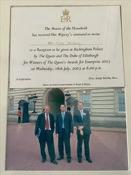
7
Derek



INSPIRING MINDS CAMPAIGN REVIEW 8 CAMPAIGN IN NUMBERS Since 2014... £39m raised for bursaries – almost £18m to endow bursaries for the future and the rest to fund bursaries for today’s pupils 4,769 people have given their financial support £2.7m has been received in bequests Alumni live in 57 countries and 3,008 have attended a Latymer event 211 members of the 1624 Legacy Society Ratio of students who joined in Year 7 on a bursary 2022 – 1 in 5 2014 – 1 in 9 2009 – 1 in 32 8,308 individuals from the Latymer community attended one of our events £546,067 raised for the Prep Bursary Fund 295 members of staff raised money or donated 473 young people have joined Latymer thanks to a bursary funded by the Latymer Foundation £3.8m given to the Upper School Bursaries Appeal by 3,982 individuals + 1624




INSPIRING MINDS CAMPAIGN REVIEW 9 Over the past year, the Latymer community has helped to raise enough funds to enable us to offer bursaries to a record number of children. This takes us ever closer towards our dream of need-blind admission. We passionately believe that the only criteria for entry to Latymer should be academic performance and potential rather than the means to pay our fees. During the 2021/22 academic year £4,470 raised for the Prep Bursary Fund by the ‘Grow a Fiver’ Challenge £7,012 raised by the comedy evening ‘Latymer Laughs’ Our youngest donor was 7 years of age and our oldest was 98 1,000km was covered in the 2Bridges Run to raise money for bursaries £4,630 raised by former parent evening classes £14,000 raised by ‘Aladdin’ the Latymer Staff Panto 784 people attended 4 nights of the Latymer Staff Panto 8 children in the Prep have been supported by bursaries 100% of Year 7 families supported our campaign 1 in 3 ratio of pupils joining 6th Form on a bursary 440 pupils applied for an 11+ bursary £27,711 was left in bequests from members of the 1624 Legacy Society YEAR 7
LATYMERIAN CHANGEMAKERS
Alex DAVIS (2005)
I joined the civil service around 11 years ago, with little real idea of what I was getting myself into. Several people told me the job description sounded incredibly dull! Fortunately, it turned out to be one of my better decisions, and it has enabled me to work on some extraordinary areas of social policy. I first worked on social housing policy, then took a slight detour to work directly for Ministers as a private secretary, before working on the Grenfell Rehousing Programme, homelessness and rough sleeping policy and strategy, and most recently heading up the team working on prison safety and security at the Ministry of Justice.
Emily HOBLE (2012)
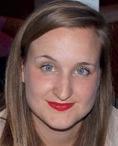
I lead Growth for Founders Pledge, a global non-profit that supports tech founders to do the most good possible with their charitable giving.
In the summer of 2012, between leaving Latymer and starting a course in International Relations at Exeter University, I went to Ghana to work for an education non-profit. Upon reflection, this was a clear case of voluntourism, and my first exposure to how ineffective, and potentially harmful, some nonprofits can be. Volunteers were thrown into classrooms with no training or context of the children’s educational level. There was no attempt to measure impact or iterate based on learnings. The CEO roaming around in his customised Rolls Royce was a jarring contrast with the surrounding poverty.
The following summer, I worked for a Bank in Bangladesh. The ethics of microfinance remain hotly debated, but the on-the-ground experience in 2013 seemed to be one of great opportunity. That
The thread that runs through all of the roles I have undertaken is that they offer a real chance to make society a bit fairer, to design systems to work more effectively for the most vulnerable, and to ensure that the government of the day gets robust and evidenced advice upon which to make decisions.
This was never more important than during the COVID-19 pandemic, when I was the lead on rough sleeping health policy. Whilst everyone was keeping safe at home during the first lockdown, we were charged with protecting those who rough sleep. In a single weekend we ensured that thousands of rough sleepers were offered accommodation, and nearly 6000 people were made an offer of accommodation within three weeks. I developed a triage system to ensure symptomatic people were separated from the vulnerable and we secured and distributed funding to allow for mental health support,
said, the organisation was chaotic, bureaucratic and painfully slow. My experiences in Ghana and Bangladesh opened my eyes, I knew we could do better but I didn’t know how.
As part of my undergraduate degree, I moved to Shanghai for a year - where I made friends from all over the world and fully immersed myself in the culture. Whilst there, I did an internship for London & Partners, the Mayor of London’s economic development agency. I ended up working for London & Partners for five years after graduating, initially as a foreign direct investment specialist, and latterly becoming Head of Corporate Engagement.
My clients at London & Partners were predominantly high-growth tech companies. Having up-close exposure to these companies was fascinating, they had so much money, so many smart people solving big problems and so much data. It got me thinking: How could we utilise these resources to tackle global problems like climate change, poverty and health?
To truly understand the different theories and models for combining profit and purpose, I completed an Executive MSc in Social Business and Entrepreneurship at the London

medical supervision and outreach workers. The scale and pace of this work was unprecedented.
Sixteen people who were sleeping on the street sadly still lost their lives to Covid-19, but the National Audit office says that this work prevented more than 20,000 infections, and at least 266 more deaths. While the ‘Everyone In’ policy was not designed to support wider work to end rough sleeping, at the end of November 2020, a total of 23,273 people had been supported to move into settled accommodation or were on a housing pathway. This was the most challenging project I have worked on to date but also the most immediately impactful and something I will always be proud of having been a part.
I have recently accepted a new role as Deputy Director to head up the Rape Review and Sexual Violence Policy in the Ministry of Justice and I am looking forward to a new challenge.
School of Economics in 2020/21. It was here that I learnt about a fast-growing movement called effective altruism, which encourages the use of data to determine where resources can be best used to tackle big problems.
Much of the work that Founders Pledge does is inspired by effective altruism. We equip our 1,700 members with everything needed to maximise their impact, from evidence-led research and advice on the world’s most pressing problems, to comprehensive infrastructure for global grant-making, alongside opportunities to learn and connect. To date, our members have pledged over $8 billion to charity and donated $800 million. Notable members include founders behind companies like Airbnb, UiPath, FarFetch, Unity and Klarna. As Growth Lead, it’s my responsibility to identify and pitch to new potential members.
I’m grateful that Founders Pledge is very flexible. Recently I have been enjoying the digital nomad life from Porto to Puglia. Cape Town and Buenos Aires are next! I’d love to set up Founders Pledge’s operations in Asia or Africa one day, which would bring things nicely full circle to those summer experiences as a teenager.
10
LATYMERIAN CHANGEMAKERS
Nominate a Latymerian changemaker you know! Email us on Latymerians@latymerfoundation.org
Alexandra HOLKER (2014)
When I left Latymer, having spent over a decade there, I was anxious about the future. I had narrowly missed my Cambridge offer and was off to study Art History at the University of St Andrews. Missing that offer was the best thing that could have happened.
I had always had vague ambitions of working in diplomacy or politics, doing something ‘good’. However, the space and independence that being at university gave me challenged my preconceptions and opinions. In my first year I became involved in women’s rights, co-founding a successful student organisation which promoted youth intersectional female participation in careers and leading an initiative to combat gender-based violence within the student community.
Having finished my first year, I spent the summer in Tanzania as a volunteer for a WASH programme. The experience was eye-opening, uncovering the often-problematic nature of volunteering overseas. Within a couple of weeks, it became clear that we could not help the community in the way they had been promised. A group of white westerners had been sent under the premise of constructing
Lily ROSENGARD (2013)
In my role as Youth Advocacy Officer in Plan International’s United Nations team, I work directly with young people from around the globe, and particularly girls and young women in all their diversity. I facilitate their engagement at the United Nations - which comes in many forms, and involves advocacy with Member States and the UN system at large to be more inclusive of young people, and to put the voices and priorities of young people at the centre of decision-making at all levels of the UN.
I am a passionate intersectional feminist, and have been since I got involved in advocacy and activism whilst at university. I became heavily involved in gender equality activism as my university’s Women’s Officer, but I wasn’t sure how this would translate into a career - I didn’t know that ‘gender equality’ was a job!
I soon discovered the world of gender policy work and that of non-


a pipeline to the local water source, but we were far from equipped. Our arrival had given this community hope of access to water, which meant potentially fewer water-borne diseases, and hours of walking every day could be swapped for more time at school. We were branded as tourists; the programme had concentrated on our own personal growth and ways of bolstering our CVs, all under the guise of doing ‘good’. We were not aid professionals. I felt we had no right to be there. Confronting this embarrassment, we decided to focus on making a tangible difference. We started a Girls Group, which gave teenage girls at the school a safe space to learn about puberty, contraception, and HIV/AIDS.
This difficult experience cemented my desire to work in humanitarian policy and development, specifically gender and climate justice. During subsequent summers and holidays, I interned at reproductive rights organisations around the world, including the International Planned Parenthood Federation (IPPF) in New Delhi and the reproductive rights agency of the United Nations (UNFPA) in New York. I tailored my undergraduate degree to reflect my activism; my dissertation focused on the representation of women’s bodies and feminism in Indian art. Graduating in 2019, I subsequently completed my MSc in Development Studies from SOAS in London in 2020. For
someone with dyspraxia, who was consistently in the bottom Maths set, having MSc after my name continues to surprise me.
A few weeks after handing in my thesis, which considered the links between reproductive justice and climate change mitigation, and midpandemic, I started working at the British Red Cross. Starting in their UK policy team, coordinating their political engagement with Parliament, I now work as Humanitarian Policy Officer in the International Law and Policy Team. I mostly focus on climate adaptation policy and humanitarian diplomacy. I also lead the organisation’s Neurodiversity Network, giving talks on dyspraxia in the workplace, and am involved in our Gender Equality Network. While I don’t currently work on gender, I do run a feminist club outside of work, which helps keep that activism alive for me. It now has over 80 members, including a few Latymerians!
As everyone does, I found being a teenager challenging. It took a few years after leaving school to feel confident in my abilities and goals. My advice for younger alum (that makes me feel old) – be kind to others, and to yourself. We all have a responsibility, particularly in this current economic and political climate, to make choices that benefit the most vulnerable, and to speak up for those who can’t themselves.
profits and international NGOs, and off the back of this passion, began my Masters in Human Rights - which helped me gain a framework in human rights mechanisms (bolstering my ability to successfully do my job!).
Whilst at university I worked with a gender policy think tank, where I focused on gender policy research and the topic of comprehensive sexuality education, and advocated for this to become mandatory in schools. I really enjoyed this work because it linked with my role as Women’s Officer in pushing to have compulsory consent workshops for all incoming students, which I then led.
Following this experience, I moved to Hanoi, Vietnam to work on a women’s economic empowerment project funded by the Australian government. I then moved back to London to begin my career in the Global Partnerships team at Plan International, where I first worked on global partnerships for influence with civil society, multilateral UN agencies, private sector and youth partners. This was a lot of fun, in particular connecting with experts on topics from sexual health and reproductive rights, to early
childhood development, and girls as active drivers of change!
Last year, I changed roles within the organisation and moved to New York to work specifically on United Nations-based youth advocacy across West Africa, East Africa and the Middle East. One of my proudest moments in this role so far happened earlier this year, when I had the great honour of making an intervention on behalf of Plan International at the UN Headquarters ECOSOC Chamber on how to make youth engagement at the UN more meaningful.
The speech covered the need to focus on youth in all their multiplicity, but particularly those most marginalised by their intersecting identities. I was proud to have provided concrete recommendations for how the UN can be more inclusive, accessible, and diverse.
In attendance at the meeting to hear this intervention were: the President of the General Assembly, the UN Secretary-General’s Envoy on Youth, Member States, Observers of the General Assembly and NGO representatives in consultative status with ECOSOC!
LATYMERIAN CHANGEMAKERS 11
John RAY (1964)A CAREER IN EGYPTOLOGY
A CAREER LESS ORDINARY
My interest in ancient Egypt really began when I came to Latymer. In the spring of 1958, our form, 2H, was given a merit half, and we were taken on a trip to the British Museum. There, for the first time, I saw their Egyptian collection. There was a colossal head of pharaoh Ramesses II (the Ozymandias of Shelley’s famous poem), looking out, serene and self-satisfied, over the rest of the sculpture gallery. There was the Rosetta Stone, the key to the mysterious hieroglyphic writing, and the richly illustrated manuscripts of the Book of the Dead. In addition, there was a mummified ginger tomcat, unwrapped and more than a bit bedraggled. It turns out that this cat is one of the most gazed-at exhibits in the entire museum, perhaps because of its complete ordinariness.
The following year, when I was 13, I started going regularly to the Museum, often in the company of another school friend, Roger BROOKS (1963). On one of these visits we saw, in the window of a bookshop opposite the Museum, a grammar of Egyptian hieroglyphs. It was huge, and quite beyond me at the time, but I knew that I needed to have that book. It cost three guineas, which was a lot of money in those days, and my family was not well off. But when my father realised that I was serious he said, “I will give you a guinea, your mother will give you a guinea. Go out and earn the third guinea”. I was able to scrape this together from pocket
money and a paper round. I remain in contact with Roger, and I still have the book.
I first took part in a dig in Egypt in 1968, when I was still an undergraduate. It was at the site of Saqqara, which is on the edge of the Sahara Desert about 20 miles south of Cairo. If you looked to the north, you could see the famous pyramids of Giza. If you looked the other way, there were even more pyramids, just as impressive. However, the dig also turned out to be in the middle of a war zone. Work was frequently disturbed by the sonic boom of a fighter jet, since we were still in the aftermath of the Six Day War between Egypt and Israel. There was a military base just over the horizon from where we were digging, as the occasional explosion reminded us. Power cuts were frequent, and we learned to work by the light of paraffin lamps.

I was very much the junior boy, charged with the most basic jobs, such as sorting out the pottery. I would work at the corner of one of the tables in the storeroom. On the table there was an ancient papyrus which had been discovered during a previous season. It was now framed and under glass. It had clearly been pinned in ancient times to a noticeboard, and written in Greek, it read “Sacred area. Out of bounds to troops. Orders of Peukestas”. An expert in papyrology came out to look at this text, and he said, “Do you know what you’ve got? Peukestas was the commander
that Alexander the Great put in charge of the city of Memphis after he conquered Egypt”. The ruins of Memphis were just down in the valley, below where we were working. We had found a letter from one of Alexander’s generals.
Our site went on to produce hundreds of written texts, preserved in the dry sand. Many of these were on papyrus, the ancient equivalent of paper. There were shopping lists and personal letters, appeals to various gods to right injustices, school exercises and literary tales. One text in particular was really intriguing. It contained a series of lines, each one mentioning a bird, then a bush or tree, and finally a locality. These names all began with the same sound, which turned out to be different in every line. It was as if we recited, “The crow perched on the chrysanthemum and flew away to Croydon”. What was going on? After a while my colleagues who were working on this text realised that this was the way that ancient Egyptian schoolchildren learnt the order of their ABC. Before this text, we had never known how the Egyptian alphabet worked. Other texts were written on sherds of pottery; these are known to Egyptologists as ostraca. A large number of these turned out to be written in the same hand, and we slowly came to realise that we had dug up the entire life story of a particular man. He was named after the god Horus, and he was born around 200 BC. He started out as a minor priest and a worshipper of the goddess Isis, but when he was in his thirties he experienced a dream in which he escaped from a labour gang, but was brought back and interrogated by the foreman. But this foreman was not human: he was another god, Thoth, the patron of writing and knowledge. He told the runaway priest that he was not to worship any other god but him.
As a result of his experience Horus changed his name to Horus-Thoth. Here we were dealing with an ancient midlife crisis, and a religious conversion. I realised that I was the first person since antiquity to be able to enter into this man’s thoughts. On another text, Horus the troubled scribe wetted his thumb and rubbed out a line he had just written. There in the corner of the sherd was his inky thumbprint, fresh after twenty-two centuries.
12
Our site never failed to surprise. One December morning I came down to the dig, and there in the wintry sunlight was a row of limestone slabs, which had been laid out by the workmen. These were clearly gravestones, and they had captions in hieroglyphs, but there were also lines in another script, which I could not recognise.
I asked our surveyor who he told me, “That is Carian, and nobody can read it”. The Carians came from the corner of what is now Turkey, opposite the island of Rhodes, and they were employed by the pharaohs as mercenary soldiers. What we had found was part of their cemetery, with headstones written in Egyptian as well as their own language. Here at last was the clue to understanding this mystery script. I was lucky, and made some steps towards reading this long-lost writing. These first steps were soon overtaken by others who were more expert in this sort of thing. But now, at last, we can read Carian. There was an ancient Egyptian saying that to speak the name of the dead was to make them live again. Thanks to our discoveries at Saqqara, we have given back to those ancient soldiers of fortune something of their forgotten lives.
Later we started work in the catacombs known as the Serapeum. By the entrance there were the inscriptions left by the ancient workmen who had helped to construct this enormous complex. Next to these, by a doorway, we came across another inscription, written in pencil. We were fairly sure the ancient Egyptians did not use pencil, so we took a closer look. It was the names and regimental details of a group of Australian soldiers, who had come to this place on a sightseeing trip in February 1915. They were stationed in Cairo, but they must have been on their way to Gallipoli. We made a copy and sent it to the Australian High Commission in London. It also found a place in our eventual publication, because these modern visitors were also part of the history of the place. Many people had passed through this site over the centuries, and we, the excavators, were merely the latest.
There were encounters with the living as well. One weekend the embassy in Cairo told us that they were sending us some guests to entertain. We groaned. The embassy did useful things for us, but taking care of their guests meant taking them round the sights and making rather a lot of small talk. That Sunday we heard a knock on the door of the dig house, on the side facing the garden. Nobody
ever came that way; instead, people arrived via the courtyard on the other side of the house. But I opened the door, and there, framed against the backdrop of the Nile valley, was Joanna Lumley. My thoughts came immediately: “I have been in this desert too long. I am hallucinating”. But it was real. She, and another actor, Michael Kitchen, were the guests that we were meant to entertain. A delightful day followed, and our opinion of the embassy went noticeably up.
One of the pleasures of being an Egyptologist is that from time to time you get invited to give talks on cruises, either in the Mediterranean or along the Nile. One year I was with a party on the Nile, and we sailed as far as the temple of Dendera, which is some distance north of the wellknown site of Luxor. At sunset we set out walking to the old temple, which is amazingly well preserved, and we climbed up the great staircase which leads to the roof. The walls of this staircase are lined with figures of the ancient priests, whose feet are shown marching up the stairs, as if they were accompanying their visitors. We came out onto the flat roof, underneath the stars. One of the passengers was an actor, James Grout, who was perhaps best known as the cantankerous boss of Inspector Morse. The real James Grout was not at all cantankerous, and he agreed to read to the group a passage from A Thousand Miles Up The Nile by Amelia Edwards. Edwards visited Dendera in the 1870s, and in her account of the place she imagines that there must be one weird night in the year when the figures on the staircase come to life and continue their sacred journey. This was the passage James Grout read to us, and it could not have been better chosen, because the night we were there was New Year’s Eve. I doubt if anyone who was on that cruise will forget that evening.
I particularly valued these cruises, because they combined two things which Latymer did so much to develop in its pupils. One of these was an affection for history, in my case a love of the ancient world. At school there was Peter Lineham, who first taught me Latin. Then there were Geoffrey Grimsey, and Roger Perry, who later set aside much of his own time to help me with Greek. In 1962 some of us went on a school trip to Greece and Italy. This introduced me, not merely to ancient ruins, but to the colours and textures of the classical world. My father had died the previous year, and at home money was tight. It was not until decades later that I learnt that the school had known this, and had paid for my trip.
The other love which school helped to bring out was acting. There was the Gild practically every week, and the Jantaculum at Christmastime. There were Alan Rickman, Roger Gartland, Stephen Wyatt, and many other talented performers. Here, the teachers I owed most to were Wilf Sharp, Jim McCabe, Brian Binding, and, once again, Geoffrey Grimsey. What a unique set of gifts from a school!
I went on to be a kind of teacher myself. It has often been said, but it remains true, that a teacher spends part of his time imparting knowledge to his pupils, but for much of that time he is the one who learns from them. I can only hope that I have been able to pass on to my students something of what I received from Latymer. This too is part of repaying one’s debt, and it is the way of earning the third guinea.
John RAY (1964) was a lecturer in Egyptology at the University of Birmingham, and afterwards Herbert Thompson Professor of Egyptology at Cambridge. His The Rosetta Stone and the Rebirth of Ancient Egypt is published by Profile Books.

13
A CAREER LESS ORDINARY
Latymer
Round Square is a network of 180 schools in 50 countries worldwide, all of whom share a world-class approach to character education. It’s an incredibly important platform for encouraging our young people to be courageous and compassionate leaders of the future, and in September Latymer was pleased to welcome 1200 students around the world, from schools who invest in this shared ethos.
Round Square endorses and promotes the IDEALS – values of Internationalism, Democracy, Environmentalism, Adventure, Leadership and Service within education – all of which chime with the values and ethos of our school. We are really proud to have celebrated cultural diversity and connection with our international guests, particularly at this time when the world is feeling increasingly polarised.
LATYMERIAN
Over the summer, Year 12 pupil, Siddhangana, climbed Kilimanjaro, the tallest mountain in Africa and raised over £2,000 for M-Lisada youth centre and orphanage in Katwe, Uganda.

Latymer has supported M-Lisada since 2013, when we set up the Latymer Uganda Project.
Since then, we have sponsored eight children a year, paying for their school fees, school uniform, school trips, books, and stationery.
As part of their induction programme, our new Year 7 pupils spent day one of term on their first action packed trip together to Longridge Activity Centre in Marlow.

After a short coach journey, during which new friendships were already being formed, they couldn’t wait to get stuck into the various activities on offer!
The pupils all put in great effort and took away new practical skills, happy stories, and a sense of familiar community in the year group.
Over the summer, 33 Latymerians from Years 11 and 12 took part in a World Challenge Trip to Ecuador.
Over four weeks they visited Quito, Minzo (in the Cloud Forest), completed some high-altitude hiking around Chimborazo and conservation work on the coast in Puerto Quito to support and protect turtles. Whilst there, our students also took a boat trip to see Isla de Plata and saw a plethora of wildlife.
“The day-to-day challenges of expedition life encourage students to develop life skills and build deeper confidence, resilience and empathy,” said Liz Green, Latymer’s Head of Design Technology and trip leader.
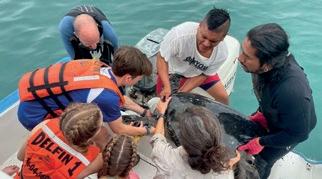
Six Latymerians – Alec (Year 11), Indira (Year 12), Jack (Year 11), Leo (Year 11), Marnie (Year 11) and Oscar (Year 11) –pictured here with teachers Mr Laws, Mr Barry-Parker and Mr McGee, were selected to row for Team GB this summer.

“This has truly been an incredible summer for Latymer Upper Boat Club,” said Latymer’s Head of Boats, Phil McGee. “It’s wonderful to have had invitations for both the boys’ and girls’ GB rowing squads. As a club, we’re incredibly proud of what these pupils have achieved and the experience they now bring back with them into the senior squad this season.”
After 10 years as Head of Boats, Phil will be leaving Latymer early next year, when he moves with his family to Portugal. We wish him well and thank him for his fantastic support and guidance of our Latymer rowers for the past decade.

NEWS 14
SCHOOL
hosts the International Round Square Conference for 2022!
ROUND
SQUARE
CLIMBS
WE WELCOMED OUR NEW YEAR 7S
GOLDEN
YEAR 12 AND 13 TAKE ON A WORLD CHALLENGE SCHOOL NEWS
KILIMANJARO FOR M-LISADA
A
SUMMER OF ROWING
Students enjoyed a busy timetable of fun activities focusing on wellbeing and positive, healthy habits during our annual BOUNCE Week.
There were activities all over the School site from ergo challenges and cookery demos in the piazza to karaoke in the theatre, and clay play in the art studio. This year Ollie, the therapy dog, came to visit students in the library too!

Four Sixth Formers have recently been commended for their entries in prestigious competitions run by Cambridge University’s Trinity, Queens’ and Robinson colleges.
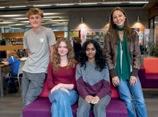
We were delighted that December’s Sunday Times “Parent Power” supplement showed that Latymer Upper School and Manchester Grammar School offered the most 100% bursaries (i.e. ‘free places’) of any UK independent school in the academic year 2020/21. 128 of our students benefited from a free place and another 115 received a bursary worth between 25-95%; the average bursary was worth just over 80% of fees.
It is hugely gratifying to see the increase in the number of bursaries offered by so many other schools since we launched our groundbreaking Inspiring Minds campaign almost 10 years ago, with its aim of raising £40m for bursaries for 1 in 4 of our students. Latymer had no significant historic endowment to rely on, so the expansion of our bursaries provision since 2004 has been made possible only thanks to the incredible support of our amazing community and, for that, we are profoundly grateful.
Over the summer, Ismene won a special commendation in the Estelle English Prize run by Queens’ College, Cambridge. Her peer, Sasha, also received a ‘highly commended’ prize in Robinson College’s English Essay competition, while Max and Pearl were commended in the Gould Prize for Essays in English Literature run by Trinity College, Cambridge.
Activities Week, one of Latymer’s best loved traditions, had it all in 2022: sailing across the Solent, hiking in the Highlands, enjoying the Cornish coast, stepping back into history at the Titanic museum, sampling French cuisine in Paris, and riding through Spain!

We celebrated a stellar year of A Level results with 82% of Latymerians achieving A* and A grades, with nearly half (46%) at A*!
Overall, 88% of students secured a place at their first choice of University, including 19 students who are off to Oxbridge.
This year also saw a record-breaking number of (82) offers from International Universities - including Brown, Bocconi, Carnegie Mellon, Columbia, Cornell, ETH Zurich, Georgetown, McGill, MIT, NYU, UCLA, UPenn and Yale.
We also saw fantastic results at GCSE – with 95% of all grades at 7-9 (equivalent to A*/A), 62% of all grades are 9s (high A*), and 29 students achieving straight 9s.


Over summer, Latymer Consort and Strings travelled to Tuscany to spend five days performing in concerts in the area. 19 students from Years 10 to 13 had the opportunity to perform in beautiful churches in Siena and Florence as well as singing Mass in the Basilica in Montecatini.

15
SCHOOL NEWS
EXAM SUCCESS!
LITERARY TALENTS RECOGNISED
BOUNCE WEEK LATYMER RECOGNISED AS ONE OF THE UK’S TOP BURSARY PROVIDERS
LATYMERIANS’
IN PRESTIGIOUS COMPETITIONS
LATYMER CONSORT & STRINGS IN TUSCANY
ACTIVITIES WEEK
EVENTS ROUNDUP
PREVIOUS EVENTS
Festive Wreath Making Masterclass26

November 2022
Becky Hands-Wicks, Prep parent and professional florist, led two masterclasses which saw delegates create gorgeous traditional wreaths. They learnt about festive wreath making, its history and how to celebrate the finest seasonal foliage, mosses and fruits - all in the vibrant surroundings of Latymer’s iconic Big Art Studio.
Autumn Colours Art Masterclass
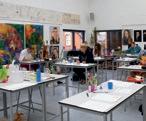
19 November 2022
This all-day masterclass on the 19 of November, saw David Mumby (Head of Art), guide attendees through creations of beautiful floral watercolours, all themed around ‘autumn colours.’ What a wonderful way to spend a Saturday in November.
Great Latymer Food
Weekend 10-12 November 2022
Across Hammersmith and beyond, an array of parties were being held – from film nights and drama workshops, to cocktail evenings and dinner parties for the Great Latymer Food Weekend. After a year when we have been trying to dust off the cobwebs from our social calendars, it was so nice to see so many from the Latymer community, opening up their homes “to host a little party that makes a big difference”!
RAIS£ Film Night 9 December 2022
Latymer’s student-led fundraising club, RAIS£, hosted a fun (and festive!) film night in aid of the Bursaries Appeal on 9 December. In doing so, they raised a whopping £700! A big shout out to our fantastic Bursaries Appeal volunteers who helped make this event such a success.

Boat naming ceremony - in honour of Martin Wade
6 November 2022
This special boat naming ceremony on 6 November honoured Martin Wade (1961), former School Captain and Captain of one of Latymer’s most successful rowing teams to date. The new Empacher boat will be for Latymer’s first-ever Girls’ Eight! We wish them all the best.
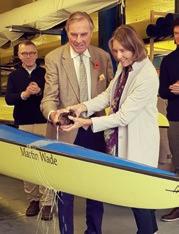
10 Year Reunion, Class of 2012
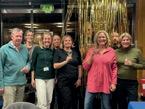
4 November 2022
It was fantastic to see so many Latymerians from the Class of 2012 at the Old Ship for their 10 Year Reunion. Attendees had a great time catching up with friends and former teachers over a drink and a bite to eat!
Inspiring Conversations with David Goodhew: A History of Latymer 15

September 2022
This captivating hybrid talk by David Goodhew educated us on the fascinating and long history of Latymer Upper School. Audience members were treated to a walkthrough of the Foundation’s history since 1624.
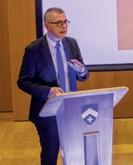
Recent Leavers’ and Graduates’ Reception 7 September 2022
It was so lovely to see Latymerians from the classes of 2017 and 2021 at our Recent Leavers’ and Graduates’ Reception. Everyone had a lovely time catching up since leaving King Street.


1624 Society
Afternoon Tea30 June 2022
It was so heart-warming to see members of the 1624 Society* come back to Latymer for our yearly 1624 Society Reception. Guests were entertained with a lovely performance by the Year 4 Choir in the Main Hall, followed by a presentation on the history of Latymer, before taking to their seats for a delicious afternoon tea.
Henley Royal Regatta 2022 28 June 2022
We were delighted that both Latymer’s Boys 1st VIII and Girls 1st VIII were able to compete in the first couple of days of one of the most prestigious rowing regattas in the world. Richard PHELPS (1983, Former Parent, Olympian and Henley Steward), very kindly hosted an afternoon tea in the Stewards’ Enclosure, offering the ultimate vantage point to experience the competition and catch up with coaches, friends and alumni of the LUSBC.

16
*The 1624 Society acknowledges and celebrates those who have pledged a gift to Latymer in their will.
The Renaissance Psychology of Art18 January 2023

Join Art Historian Robert Orme for an online talk exploring Renaissance art and how psychology helps us to enjoy the aims and achievements of art.
Parallels between Modernist Art and Literature 25 January 2023
The second in Robert Orme’s trilogy of art talks, explores the parallels between modernist art and literature.

Dr Hilary Jones in Conversation with Taylor Downing 26 January 2023

Join Latymerians Dr Hilary JONES (1971), MBE, GP, author and medical broadcaster and Taylor DOWNING (1971), historian, TV producer and writer, online or in-person, for a fascinating discussion on their careers and shared passions!
Paschal Beverly Randolph 1 February 2023
The final in the trilogy of art historian Robert Orme’s talks. It will explore the beliefs of this fascinating 19th century American Mulatto occultist of the 1860s, and discuss their significance on modern culture.

Join us in the Archives Spring onwards - by appointment only Dive into Latymer’s history together with the Archive and Alumni team. Explore fascinating memorabilia and share your own school stories as part of our Histories Project for the new Digital Archive.
On the Road: Edinburgh 2 February 2023

Calling all Latymerians studying, working, or living in and around Edinburgh! Join in the afternoon for a cuppa and cake, or in the evening to join your fellow Latymerians for a drinks reception!
On the Road: Oxford 9 February 2023
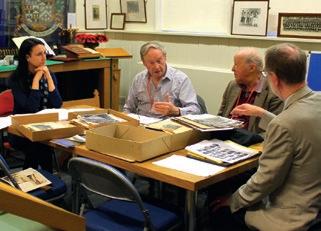
Calling all Latymerians studying, working, or living in and around Oxford! Join your fellow Latymerians and the alumni team for a drinks reception in Oxford to find out what you have all been up to since leaving King Street!
Exclusive Guided Tour of the Imperial War Museum with Taylor Downing 25 March 2023


Explore one of the most fascinating museums in London with Latymerian, historian, author and awardwinning TV producer Taylor DOWNING (1971).
DATES FOR YOUR DIARY
1624 Legacy Society Afternoon Tea Reception11 May 2023

Members of our 1624 Society are cordially invited to the Tea Reception. Hosted by
Head of Latymer Upper School and James
(1976), President.
17
David Goodhew,
Graham
UPCOMING EVENTS
FONDLY REMEMBERED
OBITUARIES
n John MALHAM (1955)
n Christopher MALTBY (1958)
n Nicholas WALOFF (1969)
n Laurence WARWICKER (1948)
n Tim BAKER (1955)

n Brian BALDING (1951)

n Michael GLOVER (1948)
n Alan BLACKWELL (1963)
n Dr Thomas KOLB (1953)
n Mark GARDENER (1990)
n Dr Gerald GAFFIN (1954)
n Ranjit ANAND (1967)
n Jefferson MACKAY (1954)
A WONDERFUL LEGACY
n Dennis BASTEN (1951) attended Latymer on a direct grant scholarship. He went on to enjoy a career in hospital management, leading him to become the Chief Executive of Horton General Hospital in Banbury until 1990 - but he never forgot the debt he owed his old school for the life changing education he received. He kept in touch with us over the years, and supported our Bursaries Appeal, but never mentioned to us that he had included a bequest of 1/16th of his estate to Latymer in his will, alongside gifts to his family and other charities.
When Dennis passed away recently at the age of 89, we were notified of the generous legacy he had left to Latymer. We are so grateful to Dennis as his gift will go towards funding bursaries for young people just like him. Students who will thrive at Latymer but, without a bursary, their family’s financial circumstances would prevent them from joining our school.
Dennis will, posthumously, be made a member of our legacy group, 1624 Society, which would have enabled us to thank Dennis during his lifetime for his kind bequest. If you, like Dennis, have included a gift to Latymer in your Will, we would be so grateful if you could let us know. We would love to be able to thank you in person for your generosity and foresight and to welcome you to our annual 1624 Society event hosted by the Head.
n Beth PEVSNER (2015) Beth tragically died aged just 25 on 20 August 2022 from septic shock, brought on by an abdominal infection. She was funny, kind and just beginning her wonderful life.

After Latymer she graduated in Economics from Durham University, where she captained her college Boat Club, then qualifying as a Chartered Accountant at PwC and starting an enjoyable career at venture capital firm Molten Ventures. She will be sorely missed by so many from all aspects of her short but happy life.
Beth’s family are raising money in her memory and have set up a JustGiving page for Centrepoint, the Trussell Trust, and the UK Sepsis Trust - two charities for the homeless and tackling food poverty that were close to Beth’s heart and one that will hopefully help other families to avoid such a tragedy.
To donate please visit the following webpage: www.justgiving.com/team/remembering-Beth
n Major General Tony MEIER (1956) CB OBE We are grateful to Tony’s Latymerian friends, Charles KEMP (1956), Tony BUDD (1959), and Ian MICHELL (1962), for the following tribute.
That his education at Latymer influenced Tony’s career choice is beyond doubt. Tony always hungered for action! Even before arriving at Latymer, he had joined the Sea Cadets, and he maintained this interest, enrolling in Latymer’s Combined Cadet Force. It was in the CCF that a particular beacon took his attention. He was inspired by the life and war experiences of its commanding officer, Major Thomas Stewart OBE MC. From then on there was little room for any doubt about the general direction his life would take.
As Tony himself later admitted, his early years at Latymer concentrated too little on the academic side and rather too much on sports activities: rowing on the Thames, playing tennis, swimming at Lime Grove baths, playing basketball in the school gym, athletics, and cross country running from Wood Lane. When he was about to enter the sixth form, he realised that he needed to become educationally qualified to apply for entry to the Royal Military Academy Sandhurst. To qualify, he had to pass the Civil Service Commission examination; he then settled down to work and did really well. Upon leaving in 1955, he was pleased to receive the following report from the Head, Fred Wilkinson: “There is no doubt about his going all-out to attain his ambition. He has entirely deserved success.”
Tony successfully applied to Sandhurst, passing-out in the top cohort and was commissioned into the Royal Army Service Corps. In time he was posted to the British Gurkha Regiment to set up their full logistical capability. This was an enlightened posting as it reflected his strong streak of competitiveness. The Gurkha Regiment had various global postings, and Tony met his future wife Susanne, then serving in Queen Alexandra’s Royal Army Nursing Corps shortly before being posted to Hong Kong. They had a daughter and two sons. After leaving the Army, Tony continued to seek activity, enjoying pushing himself and encouraging others. Thus, he became Chairman of Governors of The Duke of York’s Royal Military School, Dover, and of St Bede’s School Trust.
While Tony’s focus was ever forward and very perceptive, he did look back with affection to Major Tom Stewart. When meeting to honour the interment of Tom’s ashes at Latymer, he and two friends from the former CCF created a social group of like-minded ex-CCF friends, which Tony named the “Fledgling Army Run by Tom Stewart”. They still meet twice-yearly near the school and continue to honour Tom’s name, and now Tony’s too.
n Bruce RUSSELL (1964)
We are grateful to Bruce’s wife Alison Russell for sharing the following tribute with us.
On leaving Latymer, Bruce attended the Chelsea School of Art in 1964, where he studied graphic design before switching to painting. He attended alongside fellow Latymerian and lifelong friend, Alan RICKMAN (1964).
He married Alison Delacour in 1979. The Wiltshire wedding attracted many artist friends, including John Hoyland, whose collective dress sense – kipper ties, ill-fitting suits - convinced the locals that they were the Flying Squad. In 1988 Bruce and Alison moved to Liss, in Hampshire, with their children.
18
We mark the following Latymerians who have sadly passed away recently.
Bruce became an inspirational art teacher. At Newcastle Polytechnic (1975-78) he set up the Newcastle Polytechnic Gallery, before heading down to London where he joined St Martins from 1979; his students included Peter Doig and Simon Bill. Then, from 1987 to 2006 he was Head of Fine Art at Kingston University, where he founded the Stanley Picker Gallery.
Bruce was one of the most original and admired abstract artists of the 1970s and 80s. His paintings will be remembered for their startling vivacity, their verve, their jazzed-up cubism. In 1977 he wrote that he loved “chemical, candy, culinary, ‘untastefully’ synthetic colours, in dissonant combination with earth pigments”. He sourced his motifs from “vorticism, Bauhaus, Art Deco, those interestingly awful ‘contemporary’ fabrics and furnishing of the 50s”.
n David KNIGHT (1955) We are grateful to David’s wife, Kate, for the following tribute.
David was born in Northolt, West London in 1937. He won a scholarship to Latymer, arriving in September 1948.

He was very much involved in music from the start, having piano lessons as a child, and later receiving a scholarship as a Junior Exhibitioner at the Royal Academy of Music.
David was in the last cohort for National Service, drafted into the RAF. He was posted to a bomber squadron Victor Valiants and became an Air Electronics Officer (AEO). Reaching the rank of Flight Lieutenant, he trained new AEOs and learnt Mandarin - all while keeping up his music by playing for Sunday services at a local church.
When he left the RAF, David decided to go into teaching. In his last term as Head of Music at the University of Worcester, he met his wife Kate. Together, they moved to Norway where David joined the Church of Norway as an organist. On their return to the UK, David became an examiner for the Associated Board of the Royal Schools of Music. He examined across the globe, including; Ireland, Hong Kong, Malaysia, Indonesia, Singapore, and Taiwan.
David continued, right up until his death, as an organist and choirmaster at numerous parish churches around the UK, also becoming an examiner for the Royal School of Church Music and conducting various choirs and bands.

n Brian CATLING (1943) We are grateful to Brian’s daughter, Jane, for the following tribute.
Brian was born on 24 November 1925 to Frank and Purse, and began school at Ravenscourt House School before attending Latymer Upper School. He was evacuated to Gerrards Cross in 1939 with his brother, Michael CATLING (1946).

Brian was proud to have attended Latymer, where he met lifelong friends, including Ron NETHER (1946).
Brian married Daphne on 25 July 1953 in St Nicholas Church in Chiswick and together they had a daughter, Jane.
Brian served for four years in the army. Upon his return, he began working at Pathe Pictures, learning the film and photography trade. After moving on to work for a photographic company, he set up his own business as a school photographer. His late wife Daphne worked with him in the business.
Brian had a number of hobbies and interests. He enjoyed building model railways and won two bronze medals for
his buildings at the Model Engineering Exhibition. He was a keen and active member of the Masons too. Over the years he was a member of several lodges but due to the school connection, Latymer Lodge held a special place in his heart.
Brian was very proud of his family and leaves a Daughter, Jane, grandsons Alex and David, and great grandson Rupert.
n Stephen BROWN (1969) We are grateful to Stephen’s New York Met colleagues and Latymerian friend, Michael NORMINGTON (1974) for the below tribute
Opera was Stephen’s passion, and he put his vast knowledge to work in his Met career that lasted almost four decades until his retirement in 2017. As a gifted stage manager, Stephen exercised the immense responsibilities of that job with confidence, tact, and humour. As Company Manager, Stephen’s familiarity with the Met’s productions and his ability to direct artistic forces earned him the respect and admiration of the entire company.
Artists and fellow staff members alike relied on Stephen’s leadership and deeply valued his support. Moreover, Stephen had a reputation as a lively raconteur, and he would regularly relate backstage anecdotes that astounded and amused.
Outside of his work at the Met, Stephen had an impressive resumé as a director of theatrical productions and as a stage manager for theatre and ballet companies in addition to his operatic work. He frequently wrote and lectured authoritatively about opera and often served as a panellist on the Met’s Opera Quiz during the Saturday Matinee Radio Broadcasts.
n Jimson BIENENSTOCK (1982)
We are grateful to our Canadian Latymerian Council members for sharing the below tribute with us, as written by Jimson’s family.
Jim was a friend, colleague and mentor to many. He was also a member of the Canadian Latymerian Council and enjoyed many meetings with his fellow Canadian Alumni.
A man of many talents, he was an entrepreneur whose specialty in the hospitality world was to build and develop special places where food, wine and conversation left lasting happy memories. He opened and ran sugar refineries in Jamaica and Australia, and then bars and restaurants in Paris and Lille in France. In Paris, he had his daughters Bella and Elsa with wife Johanna, and he earned an MBA with Top Honours at ESSEC Business School.
He returned to Canada in 2005 with his family, and soon several establishments of high repute such as George, the Royal York, and Soho benefited from his involvement. His amazing palate was recognised, and he became a Board director of the Canadian Association of Professional Sommeliers.
He opened HotBlack Coffee and won far-reaching international acclaim in the New York Times, and even appeared on the Jimmy Fallon Show (NBC), when he shut down Wi-Fi in his coffee shop to promote its main purpose of old-school service and warm interactions.
Jim engaged with equal energy in business and charitable activities, and brought his unquenchable sense of humour, fun and enjoyment to every encounter. His favourite place was his cottage in Pointe au Baril, and his favourite people were his daughters

19
OBITUARIES
Pre-bookings required – register under ‘Events’ on our website www.latymerfoundation.org



One of the ways in which we are marking the Foundation’s 400th anniversary is by opening our newly refurbished archive to Latymer’s alumni community.


Come along and dive into Latymer’s long history – look through memorabilia and back copies of the Latymerian magazine whilst also helping us to identify fellow Latymerians and teachers from our photo collection. All over a delicious cup of tea.
Please bring your own school mementos to the archive and share anecdotes with us for our Histories Project, many of which will be included in the new Digital Archive.
Join us in the Archive will run from next spring, on the first Thursday of each month (during term time).
Join us in the Archive!
 WINTER 2022 NEWSLETTER FOR LATYMERIANS (ALUMNI OF LATYMER UPPER SCHOOL)
WINTER 2022 NEWSLETTER FOR LATYMERIANS (ALUMNI OF LATYMER UPPER SCHOOL)



































 Robin FAIRHURST (1959) John ELLIOTT (1958)
Robin FAIRHURST (1959) John ELLIOTT (1958)























































